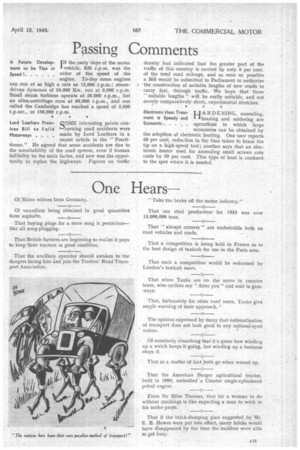Passing Comments
Page 17

If you've noticed an error in this article please click here to report it so we can fix it.
I N the early days of the motor vehicle, 820 r.p.m. was the order of the speed of the engine. To-day some engines can run at as high a rate as 12,000 r.p.m.; steamdriven dynamos of 50,000 Kw. run at 3,000 r.p.m. Small steam turbines operate at 20,000 r.p.m., but an ultra-centrifuge runs at 66,000 r.p.m., and one called the Cambridge has reached a speed of 2,600 r.p.sec., or 156,000 r.p.m.
Is Future Development to be That of
Speed
S°ME interesting points concerning road accidents were made by Lord Leathers in a recent article in the " Practitioner." He agreed that some accidents are due to the unsuitability of the road system, even if human fallibility be the main factor, and now was the opportunity to replan the highways. Figures on traffic
Lord Leathers Promises Bill to Euild Motorways . . . density had indicated that the greater part of the traffic of this country is carried by only 5 per cent. of the total road mileage, and as soon as possible a Bill would be submitted to Parliament to authorize the construction of suitable lengths of new roads to carry fast, through traffic. We hope that these " suitable lengths" will be really suitable, and not merely comparatively short, experimental stretches.
Electronic Heat TreatLIAR D ENING, annealing, ment is Speedy and A 'brazing and soldering are
Economic operations in which large economies can be obtained by the adoption of electronic heating. One user reports 88 per cent, reduction in the time taken to braze the tip on a highspeed tool ; another says that an electronic heater used for annealing small screws cuts costs by 50 per cent. This type of heat is confined to the spot where it is needed.




















































